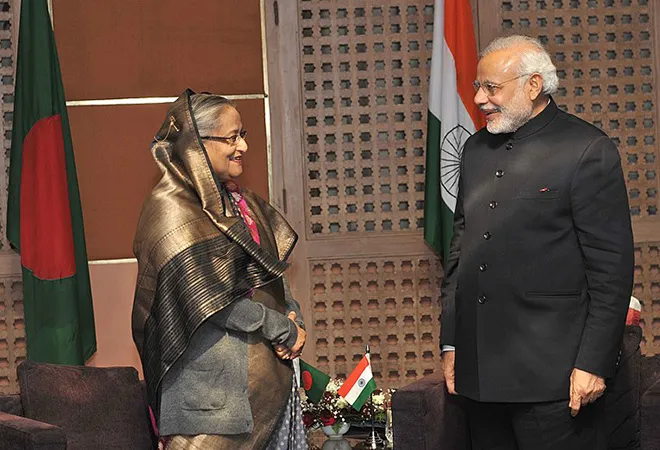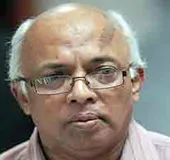
Harsh Vardhan Shringla, India’s High Commissioner in Bangladesh, made it known the other day that New Delhi looked upon the forthcoming elections in Bangladesh as a matter to be decided by Bangladesh’s people. The statement, while innocuous in form, was nevertheless a hint of how important the India factor continues to be for Bangladesh. In recent times, the significance of Indian diplomacy in Bangladesh has had to do with China’s Belt-and-Road Initiative, a project which Beijing has been busy trying to persuade nations in Asia into accepting as a guarantee of economic cooperation with China and resultant affluence for local populations.
Policymakers in Bangladesh, with a powerful Sheikh Hasina as Prime Minister, have however stayed clear of such Chinese blandishments, proof of which is to be found in the government’s unwillingness to give Beijing access to Sonadia.
Obviously, the disturbing stories coming out of Sri Lanka’s Hambantota port, which today is effectively Chinese territory in light of Colombo’s inability to pay back the loans it had earlier obtained from Beijing, were a factor, among other factors, in Dhaka’s decision to resist pressure for a handover of Sonadia to China. Again, with the growing perception that the development of Gwadar on Pakistan’s Makran coast could well presage a situation where the new port, developed through Chinese largesse, would pass into Chinese hands was instrumental in Bangladesh’s decision to decline China’s overtures over Sonadia.
That said, there is also the unalterable truth that Sheikh Hasina’s government remains unwilling to upset the diplomatic status quo insofar as its policies vis-à-vis relations with India and Beijing are concerned. Dhaka is in little mood to go for any major change in its diplomacy and is clearly content to keep a balance in its dealings with the two countries. That, however, is hardly any reason to suppose that Bangladesh has adopted neutrality in its perceptions of China and India. On the contrary, it has so far given every indication of dealing with India and China in its enlightened national interest where trade as well as defence deals are concerned. One could even remark, at the risk of sounding hyperbolic, that Bangladesh has been playing smart diplomacy in its dealings with India and China. The position is in rather sharp contrast to what has been happening in Pakistan, Sri Lanka and the Maldives, countries which have clearly sacrificed national interests to easy immediate economic gratification per courtesy of the Chinese.
For Bangladesh, with the elections a few months away, there is little reason for the boat to be rocked. With such crises as the Rohingya issue threatening its economy and the social structure along the south-east of the country, the Sheikh Hasina government remains aware of the dilemma it faces as it prepares for the voting.
It is true that it has been disappointed with the positions the governments of India, China and Russia have taken over the Rohingyas, for Bangladesh had expected that pressure from the three countries on the Myanmar government would have compelled Aung San Suu Kyi and her generals to come to a settlement. That has not happened. Even so, Dhaka has refrained from making any public expressions of its disappointment, which again is a big indication of its reluctance to muddy the waters and thereby give the political opposition at home any opportunity to condemn its Rohingya policy as a diplomatic failure. The government has been meticulous in doing nothing that could upset Delhi, Moscow and Beijing and give the opposition a handle to berate it over its Rohingya diplomacy in a meaningful way.
In the final analysis, of crucial importance for Bangladesh is an urgent requirement to peer into the minds of policymakers in Delhi. With a legacy of local politics being, at a certain level, about the attitudes of the political parties toward Delhi, it is natural for observers to study pre-election trends in Bangladesh toward a neighbor with which it shares borders on the north, east and west. Historically --- and largely because of the role played by India in assisting the Bengali struggle for liberation from Pakistan in 1971 --- the ruling Awami League has enjoyed close links with and indeed has correctly been portrayed as friendly toward India. That stance has not changed despite the Bharatiya Janata Party assuming power in Delhi in 2014. Indeed, Sheikh Hasina and Narendra Modi have gone out of the way to reassert the traditional bonds of friendship enjoyed by their two countries. The Land Boundary Agreement was a fillip to the ties. Additionally, the presence of the two leaders at Shantiniketan recently and their bilateral meetings on the sidelines of such summits as BIMSTEC have reinforced relations between Dhaka and Delhi.
These ought to have been perfect catalysts for the political opposition in Bangladesh to flay the government. Surprisingly, that has not happened.
The reality, at once mystifying and encouraging, is that both the Bangladesh Nationalist Party of the jailed former prime minister Khaleda Zia and the Jatiyo Party of the former military ruler Hussein Muhammad Ershad have been making attempts to cosy up to Delhi in the run-up to the elections in Bangladesh. The BNP, historically noted for its anti-India stance and its criticism of the Awami League over what it has always considered the latter’s sell-out of sovereignty to India, appears to have come round to the idea that its traditional attitudes toward India have run into obsolescence and that it now needs a repair of ties with the Indian establishment. A delegation of the BNP undertook a visit to Delhi recently --- and that was soon after a ruling Awami League team made a trip to the Indian capital --- in what was seen as a move to convince the Indians that the party had refashioned its stance on foreign policy and especially with regard to India. Not to be outdone, Jatiyo Party chief Ershad too journeyed to Delhi in what could have been a move by him to understand Indian establishment sentiment on his current alliance with the ruling Awami League. His party has been in the uncomfortable position of trying to be both the official opposition in parliament and part of the government, where it has quite a few ministers.
The India connection is thus a major highlight in Bangladesh’s electoral politics in these times. The Awami League government has done well in the economy in the last decade, but corruption and growing authoritarianism are increasingly being seen as its Achilles’ heel.
The BNP, out of power since 2006 and out of parliament since 2014, is desperate about re-entering politics proper despite the criminal convictions of the party chief and her exiled all-powerful son. The Jatiyo Party is a house divided and confused about its future, with Ershad’s leadership constantly under challenge from his wife Roushan and her loyalists in the party.
The one curious thread which binds the three parties into a commonality of purpose in this election season is their desire to know which way the winds blow in Delhi where future relations between India and Bangladesh are concerned. Sheikh Hasina, having deepened ties with the Narendra Modi government, looks upon the relations as those which will survive any change in power either in Dhaka or Delhi. The BNP and the JP remain know that the old misgivings they entertained about India in the past no longer hold water and that a reconfiguring in diplomacy with Delhi is in order.
The views expressed above belong to the author(s). ORF research and analyses now available on Telegram! Click here to access our curated content — blogs, longforms and interviews.




 PREV
PREV


